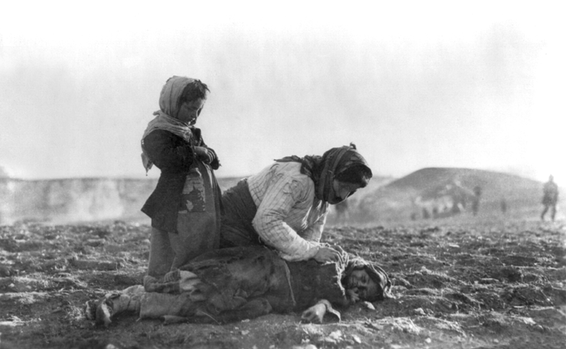The decision of the American president to recognize the Armenian genocide is a historic moment • In Israel, the struggle for recognition of the atrocities committed by the Turks in World War II is still ongoing
Armenian woman mourns her son during Armenian genocide // Photo: Wikipedia
The decision of US President Joe Biden to recognize the Armenian Genocide is a historic milestone in the international discourse on the events that took place in Asia Minor, Syria and Mesopotamia during the First World War.
Uncompromising Turkish pressure has managed to prevent for almost fifty years a sweeping American recognition of the genocide, which wiped out nearly a third of the Armenian population in the world, but Erdogan's aggressive policy, and not necessarily a sense of historical justification, ultimately toppled the wall of silence around genocide.
While in the United States the House of Representatives passed a motion of support with almost no wall, even in Israel, whose relations with Turkey have known mostly revolts in the past decade, the struggle for the recognition of Armenian genocide has won support from right and left and sides where they rarely agree on any policy.
More on this topic:
For the first time: the US House of Representatives has recognized the Armenian Genocide
Armenia celebrates 104 years of genocide: "One of the most serious crimes of the 20th century"
Opinion: Recognize the Armenian Genocide
Century: Recognize the Armenian Genocide
The history of Armenian Zionism and genocide dates back to the days of genocide itself, in the heyday of the First World War.
Avshalom Feinberg, one of the founders of the Nili underground, traveled extensively during the war, writing: "The Armenians are killed en masse ... Their men in the labor battalions are shot dead in droves.
Starve them, abuse them.
"I asked myself if I was allowed to cry 'only for the rupture of my people', and if Jeremiah did not shed blood, even for the Armenians?"
The Nazi oppressor, Adolf Hitler, also referred to the Armenian Holocaust in allusion to the extermination of the Jewish people in his speech, saying: "I do not care what the members of the weak European culture will say. Who is even talking today about the murder of the Armenians?".
"Things that are beyond politics"
In the State of Israel, the close relations with Turkey in the early days of the state, one of the few countries in the region that established ties with Israel, prevented a sweeping recognition of the Armenian genocide.
Limited ceremonies were held in concentrations inhabited by Armenians in Israel, mainly in Jerusalem and Jaffa.
In the 1980s, a movement began in Israel to recognize the rights of Armenians.
One of the most prominent speakers was the then Israeli Ambassador to Washington, Benjamin Netanyahu.
Netanyahu referred to the Armenian Holocaust and said: "There are things that are beyond politics, and there are things that are beyond diplomacy. The Holocaust of peoples is a clear case of such a category."
In 1990, a plan to assassinate the Armenian people was canceled by the Israel Broadcasting Authority without giving an official reason.
In 1994, Yossi Beilin, then Deputy Foreign Minister, referred to Turkish pressure to completely deny the Armenian genocide and said that Israel would refuse the pressure.
In 2000, Education Minister Yossi Sarid caused a stir when he attended a memorial service for the events of the Armenian Genocide in Jerusalem.
Former Minister Meir Tzaban at a ceremony commemorating the Armenian Genocide in Jerusalem // Photo: Oren Ben Hakon
In 2003, Naomi Nalbandian, a member of the Armenian community, won a beacon at the Independence Day ceremony.
A leaflet distributed ahead of the ceremony mentioned that Nalbandian was the third generation of the Armenian Genocide but was pressured not to mention it in her speech at the ceremony.
In 2007, the government dropped a bill for sweeping recognition of the Armenian genocide.
An unprecedented event took place in 2011 when the Knesset Education Committee held a discussion on the Armenian Genocide, a discussion organized by MK Zehava Gal-On from Meretz and MK Aryeh Eldad from the National Union.
On the extensive activity for the recognition of genocide, a decision on sweeping government recognition has not yet been made and many in the Israeli public are waiting for it. Today, more than thirty countries, including Western countries, and now the United States, officially and fully recognize the Armenian Genocide, only days will tell whether Israel will join their ranks.

